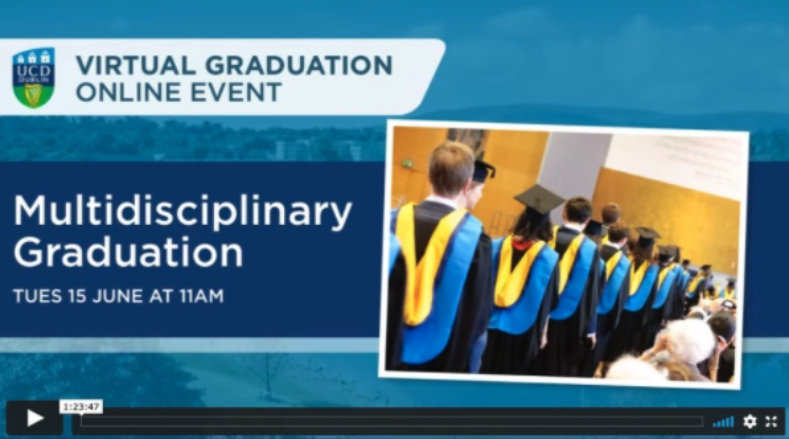Congratulations to our recent PhD graduates
News
- CS News 2025
- SECURENET 2025
- EoI for Postdoctoral Fellowships 2025
- “Back to the Future” Advanced AI Careers Evening
- SOLARIS Shortlisted for Best Research Project at the 2025 Education Awards
- First global carbon neutral conference in ICT for Sustainability
- ARMOR: Advancing AI-Driven Security for 6G Open RAN Networks
- AI research and education at UCD and career opportunities in Ireland
- Political Bias on X before the 2025 German Federal Election
- A new Book co-authored by UCD CS Assoc. Prof. Madhusanka Liyanage Explores the Foundations and Applications of Mobile Edge Computing
- UCD NetsLab Leads a Global Consortium to Tackle 6G Security Challenges
- First students conferred with MSc in Cybersecurity
- Second Workshop on the Responsible Use of Generative AI in Research
- First BDIC Conference on Computer Science and Electrical/Electronics Engineering
- Paul Gillen - global leader in the fight against cyber crime
- CS students awarded Naughton Foundation Scholarships
- First Workshop on the Responsible Use of Generative AI in Research
- Dr Brett Becker (1976 - 2024)
- UCD Computer Science Researchers Receive ReCLAIM Award for GenAI Project
- MSc Cybersecurity Research Project Presentations 2024
- UCD BSc Computer Science Conferring 2024
- UCD NetsLab Launches ORAN Testbed to Advance Security and Privacy in Beyond 5G and 6G Networks
- UCD CS Netslab researchers in a global collaboration to bolster Zero Touch security and privacy for 6G networks
- UCD STEM Early Career Researchers Symposium
- EoI for Postdoctoral Fellowships 2024
- CS start-up a finalist in VentureLaunch Accelerator Programme
- University College Dublin Joins ROBUST-6G Project
- Cyberwise Cyber Security Shared Learning Day
- 2nd Summit on Security and Privacy in Future Mobile Networks (SECURENET) 2024
- Message from the Head of School
- Ulysses Medal Awarded to Professor Geoffrey Hinton: The Godfather of AI
- UCD CS academics invited to organise prestigious Dagstuhl seminars
- UCD College of Science Women in Science Mentoring Awards
- PhD Poster Event 2024
- “Back to the Future” Software Engineering Evening
- Improving resilience to the threat of coastal flooding
- Alumnus In Conversation - Fergal Reid, VP of AI at Intercom (PhD 2013)
- Computer Science Summer School
- Welcome to CS News 2023
- EoI for Postdoctoral Fellowships
- EU MSCA SE RE-ROUTE Project Kicks Off to Design Futuristic Multi-Modal Transportation Platform
- PhD Poster Event
- UCD wins at AI Ireland AI Awards
- UCDCS Athena SWAN Award
- Jan Łukasiewicz
- International Men’s Day
- 1st Year BSc Halloween Networking Event
- Ada Lovelace Energy Hackathon
- 5G for digital healthcare in COVID-19
- UCD CS Faculty Elected Vice Chair of ACM SIGCSE
- CS Big Data project for strategies to combat childhood obesity recognised for its innovation potential
- Welcome to CS News 2022
- UCD CS to host the 27th ACM Innovation and Technology in Computer Science Education
- UCD Computer Science Success in SFI Frontiers to the Future
- Why study Computer Science at UCD?
- CAMEO project receives funding from the Disruptive Technology Innovation Fund
- Congratulations to the Class of 2021 - MSc Forensic Computing & Cybercrime Investigation
- Computer Science Colleagues’ success in Interdisciplinary Research Scheme
- ML Labs Annual Newsletter
- Seagate CORTX Challenge
- UCD Academic awarded the 2021 Beijing Great Wall Friendship Award
- Recent funding successes and industry collaborations
- EU H2020 SPATIAL project
- recsyslabs - privacy preserving personalisation for publishers
- Congratulations to our recent PhD graduates
- UCD In Conversation: Cybercrime causes, trends, and prevention
- CS researchers partner in three successful Disruptive Technologies Innovation Fund projects
- Welcome to CS News, the new UCD CS magazine
- Congratulations to our recent PhD and research MSc graduates
- New book showcases digital forensic research by UCD law enforcement graduates
- Training the next generation of Computer Scientists
- Industry Partnership Event to showcase new research on using machine learning
- Poems that Solve Puzzles: The History and Science of Algorithms
- A welcome to incoming first year Computer Science students
- Zoom for Thought with Prof. Muthoni Masinde
- iPROCEEDS-2: Starting of the long-distance master programme on forensic computing and cybercrime investigation
- Short Term Contract Positions Opportunities
- Most Influential Paper Award at the 28th International Requirements Engineering Conference
- From the School of Medicine in partnership with the School of Computer Science
- 2nd Workshop on Implementing Machine Ethics on 30th June
- CeADAR receives Enterprise Ireland Funding for a new Supercomputer
- Assistant Professor Brett Becker awarded Research Fellowship
- UCD CS Masters Student wins prestigious Intel Student Scholarship
- Navigating COVID19 data with a little help from a tame data scientist
- PhD Positions
- UCD Computer Science Project Nominated for Two Education Awards
- Vacancies - Lecturer/Assistant Professor in Computer Science (x2)
- Ad Astra Fellows - Applications to Computer Science
- CALL OPEN - PhD Scholarships 2020 in Machine Learning
- Commissioner of An Garda Síochána visits the School of Computer Science for Conferring
- Computing Education Group SIGCSEire to launch in UCD on December 11th
- UCD Computer Science wins over €34m in Research Grants in 2018-19
- UCDCS Best Short Paper award 13th ACM Conference on Recommender Systems (RecSys)
- CS Sparks Programme
- CS Sparks
Congratulations to our recent PhD graduates
The School of Computer Science warmly congratulates the PhD and research MSc students who formally graduated on June 15, 2021. Warm congratulations to their supervisors as well!
Commenting on their achievements Associate Professor Georgiana Ifrim, Director of Graduate Research in the School of Computer Science at UCD said “We commend the resilience and motivation of our students to complete their research programme under extremely difficult circumstances triggered by the covid19 pandemic worldwide. We currently have more than 140 registered research students and we had 24 research students graduating in 2020. This is an extraordinary achievement for the students and their supervisors and we warmly congratulate them on the occasion of their formal graduation event in June 2021.”

Elham Alghamdi - supervisor Asst. Prof. Derek Greene
Award - Doctor of Philosophy (PhD)
Title of research: "Semi-supervised Overlapping Community Finding with Pairwise Constraints"
“In complex networks, a network is said to have a community structure when some of its nodes tend to cluster into highly-connected sets. Identifying these communities can be
performed automatically by designed algorithms. These algorithms essentially use unsupervised machine learning i.e. rely on the network topology rather than any prior information regarding the correct community structure. My research has involved improving these algorithms by employing semi-supervised learning strategies by harnessing background information used as a source of information to provide limited supervision for the community detection process.”

Felix Santiago Anda Basabe - supervisor Asst. Prof. Mark Scanlon & Asst. Prof. Nhien-An Le-Khac
Award - Doctor of Philosophy (PhD)
Title of research: "Digital Forensics: Leveraging Deep Learning Techniques in Facial Images to Assist Cybercrime Investigations"
“We are living in an era where transactions are contactless, social media platforms are commonplace, and part of our daily life is recorded either in a permissive or surreptitious manner. Whether we are present in an online meeting, social media feed, or video stream, hundreds of bytes of information are sent through to a server. The exponential growth of storage is enabling thousands of multimedia content to be stored locally on devices but at the same time challenging investigations that are hampered by the accumulation of such devices that were stored in a laboratory. Digital forensic practitioners have become overwhelmed by the amount of data that they encounter and are requiring the implementation of artificial intelligence as tools and techniques to aid investigations, to discover, gather and analyse records swiftly. To address the digital forensic backlog, the creation of age estimation models to assist digital investigations has been proposed.”

Muhammad Fahad - supervisor Assoc. Prof. Alexey Lastovetsky
Award - Doctor of Philosophy (PhD)
Title of research: "Accurate Component-level Energy Modelling of Parallel Applications on Modern Heterogeneous Hybrid Computing Platforms using System-level Measurements."
“Accurate fine-grain decomposition of energy consumption by an application is central to sustainable and energy-efficient computing. My thesis presents the first comprehensive comparisons of state-of-the-art to measure the energy consumption by applications, and popular statistical approaches to measure their goodness. To address the challenges, it presents the methodologies to accurately determine the component-level energy consumption by hybrid applications executing in parallel on modern heterogeneous computing platforms using external power meters, and a shape-based novel statistical learning-based technique to determine the goodness of energy profiles of applications built with different approaches.”

Mehran Hossein Zedeh Bazargani Mehran - supervisor Assoc. Prof. Brian Mac Namee
Award - Doctor of Philosophy (PhD)
Title of research: "Semi-Supervised Anomaly Detection Using One-Class RBF Networks".
“Anomaly detection can be defined as ”the problem of finding patterns in data that do not conform to expected behavior” and has been used in real world applications such as fraud detection, monitoring healthcare, intrusion detection, and crowd motion analysis. This thesis investigates the possibility of modifying the Radial Basis Function (RBF) networks into effective anomaly detector networks.”
Dr Hossein Zadeh Bazargani was interviewed by The Insight Podcast and gave his perspectives on moving to Ireland and doing his PhD at UCD (starts at 20:20) (opens in a new window)https://insightpodcast.buzzsprout.com/759662/9192114

Mark James - supervisor Assoc. Prof. Fred Cummins
Award - Doctor of Philosophy (PhD)
Title of research: "Examining participatory sense-making frames: how autonomous patterns of being together emerge in recurrent social interaction"
“My research focused on how when people repeatedly interact over time they tend to form patterns in their collective behaviour. I presented the case that bodily processes in such interactions support the production of social and cultural norms, from relatively minor things, like each having our own side of the bed in a relationship, to more consequential things, like relationships with unfair power dynamics. One valuable contribution of this work is that it gives us some insight into why changing social patterns can be so challenging, i.e., because they are deeply embedded in the habits of our bodies over which we do not have absolute autonomy.”
Alexandre Langeois - supervisor Asst. Prof. Anthony Ventresque
Award - Master of Science (MSc)
Title of research: “BDTest a Framework for Testing Non-Functional Properties of MapReduce Applications”
“Big Data platforms are complex distributed systems that manage and process large data sets. Their distributed nature makes their deployment difficult and optimising their performance challenging – there are so many moving pieces, from the network to the data and job placement, the parameters of all the components of the software stack etc. The goal of my MSc was to create a framework to run distributed unit tests on Big Data platforms, to assess their functional and non functional properties.”

Claudette Pretorius - supervisor Assoc. Prof. David Coyle, Secondary Supervisor: Professor Gary O'Reilly
Award - Doctor of Philosophy (PhD)
Title of research: “Designing Technologies to Support Young People’s Online Help-Seeking for Mental Health Difficulties”
“Mental illnesses have been identified as a leading cause of disability worldwide, accounting for a large portion of the burden of disease. Help-seeking has been found to be an important coping strategy and protective factor in mental illness. A positive previous experience of help-seeking is also more likely to lead to future help-seeking and treatment-seeking. Unfortunately fear of stigma and discrimination means that many people experiencing mental health difficulties are reluctant to seek help. The availability of technology and the accessibility of the Internet has created the opportunity for more online support and sources of information, which offer alternatives to traditional help-seeking pathways. My research investigated how technology can be used to support young people's online help-seeking behaviours. Key outcomes from PhD work include design guidelines for help-seeking technologies as well online mental health resources, as well as a model conceptualising young people's online help-seeking behaviours.”
Elsa Thiaville - supervisor Asst. Prof. Anthony Ventresque
Award - Master of Science (MSc)
Title of research: “Virtual Avatars as Children Companions For a VR-based Educational Platform: How Should They Look Like and How to Improve their Language Understanding?
“Virtual Reality (VR) and Artificial Intelligence (AI) are changing drastically the field of education, with applications showing promising results in a variety of domains. However popular and appealing VR and AI are for education though there are lot of technical and research questions that remain largely open. In my thesis, I address two of the most fundamental questions regarding Virtual avatars (AI-based) in VR-based education platforms (for children): (i) inside the VR, these avatars need to be embodied and the question is how should they look like for the children to have the best (learning) experience? (ii)AI ,and in particular language technology, is known for having poor results with ”minority” targets - and this is especially the case for children - so the question is how to make the language technology (foundation of the interaction with the AI agents) more robust to children written text?”
Research study at the School of Computer Science
Academic staff and researchers in the School have made many important research contributions in a broad range of research areas. We are active in Computer Security, Data Science, Machine Learning and Artificial Intelligence, Digital Health, Foundations of Computing, Human-Computer Interaction, Information Systems, Intelligent Sensing and Multimedia, Software Engineering and Distributed Systems, as well as Emerging Topics such as ethics and sustainability.
We currently have over 100 postgraduate research students, and the School has a strong international flavor, with students and academic staff from around the world. https://www.ucd.ie/cs/study/researchdegrees/
Stay in touch!
The School keeps in touch with its graduates through the annual CS News magazine which you can(opens in a new window) sign up to receive. UCD Alumni Relations runs the online (opens in a new window)Alumni Network that students and graduates can join and connect. We have a (opens in a new window)LinkedIn group for the School and you can follow us on (opens in a new window)Twitter and other social media.
Published Fri Sept 17, 2021.
